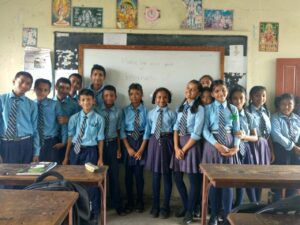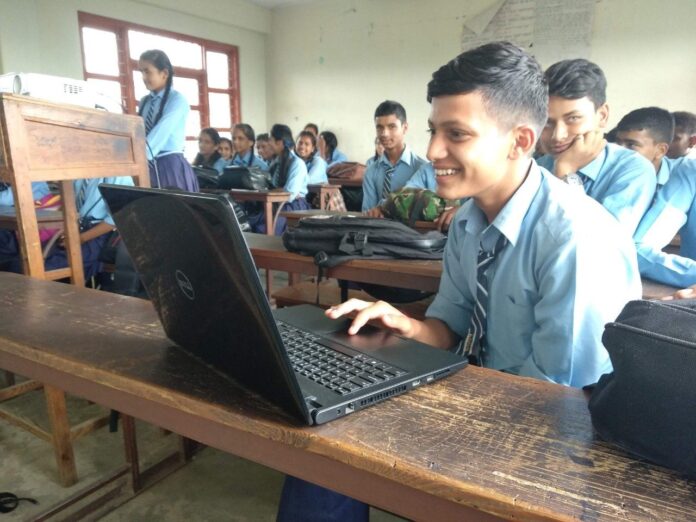Virginia Tech assistant professor of English Sweta Baniya strives to encourage her students to follow their passions and create things to be proud of. And that’s exactly what they did.
Embodying Virginia Tech’s motto, Ut Prosim (That I May Serve), and the Principles of Community, Baniya’s English 3814 class, Creating User Documentation, in the College of Liberal Arts and Human Sciences, presented an example of this motto in action by thinking locally and serving globally.
The University Libraries newest virtual exhibit, “Ut Prosim Beyond Boundaries: Global Outreach During the Pandemic,” shows how an online service-learning technical writing class served rural communities in Nepal during the COVID-19 pandemic. Inside this exhibit, visitors will discover the steps students took to enhance digital literacy in Nepal in collaboration with international grassroots-level organization, Code for Nepal. This exhibit reveals the experiences and work produced by the students, including student reflections on international service learning during a pandemic.
This exhibit is curated by Baniya, Scott Fralin, exhibits program manager for learning environments in University Libraries, and Laura Gautier, a secure computing major.
The COVID-19 global pandemic forced people across the globe to change how they work, teach, and learn. Developed countries quickly transitioned to a whole new digital landscape. However, for some rural populations in Nepal, this was not an easy transition to make because of lack of access to the online world and lack of knowledge of digital products. They needed help.

“It was shocking for a lot of the students to even know that such a digital divide exists in the world and that drew their interest in working toward minimizing such a divide as it helped them recognize their own privileges,” said Baniya.
In fall 2020, during the height of the COVID-19 pandemic, Baniya and her students collaborated online with Code for Nepal, an international nonprofit, community-based organization that works to enhance digital literacy among women in rural Nepal’s marginalized population.
“Students got to help a community alongside learning a skill set that counted toward their degree,” said Gautier. “At the same time, the community being served is benefiting from the students’ work. This creates a mutually beneficial relationship between the two. I had more drive and passion for what I was creating because I met the people it was for. It wasn’t just an assignment that would be stored away on a drive.”

The Creating User Documentation class introduces students to the knowledge and skills necessary for communicating information to diverse audiences. The purpose of Baniya’s fall 2021 class was twofold: to fulfill the learning outcomes of the class on preparing audience-centered documentation in varied environments and to calibrate this documentation for rural Nepali audiences to support Code for Nepal.
Fralin, who designed, coded, and helped shape the story of the exhibit, said, “We wanted to tell the story of how a technical writing class was able to respond to the realities of the pandemic and help a community in need at the same time using a service-learning approach.”
The class brainstormed ideas, thinking locally, where they critically thought about their own community, their family, elderly relatives, or their young siblings, all who were struggling because of the digital divide created by the pandemic. They also addressed the issue of digital literacy by exploring the cross-cultural issues of social injustices regarding gender, race, languages, and cultures. Research showed that the digital literacy rates in Nepal are a staggering 31 percent and Nepal is experiencing a recent increase in cybercrime because of the pandemic.
Together, the students created a wide range of innovative materials to help, including mobile applications, user documentation, instructional videos, and website prototypes that were designed to tackle cyberbullying and harassment among young girls in Nepal. These prototypes focused on empowering the rural population by enhancing digital literacy in post-pandemic Nepal.
“It is great for students to know that they, within their classrooms and via their computers, can serve communities in need,” said Baniya. “And that they are not just the learners but also the experts.”
Gautier’s student role in the project was to write the story of her experience in the course, assist the overall design and brainstorming for the exhibit, and find quotes from students’ final reflections to be used on their class website. Additionally, Gautier produced written and video documentation on how to recognize and report gmail phishing scams and worked in a group to create their website that served as a centralized source of all documentation created in the course.
“My class was given the challenges of the pandemic and still managed to engage and serve an international community,” said Baniya. “My students and I moved beyond boundaries to connect with the global communities and took up the challenge put forth by the pandemic and helped the communities in need.”
As a teacher, researcher, and scholar-activist, Baniya tries to apply her research and teaching in serving the community. “Research-wise, I study disasters and know how community activists help in disaster recovery,” said Baniya. “This class is preparing my students to become community leaders.”
Baniya’s students shared with her that they would like to take what they learned from the class and support their local communities. “That is a win for me,” said Baniya. “That is what I wanted to do from this class—create that ripple effect of serving local as well as global communities.”
Gautier also felt moved and passionate about the project. “I found myself pushing to improve my work with any given opportunity,” said Gautier. “I was reading my feedback on rough drafts more attentively and researching more thoroughly because I knew that someone would want or need to use what I created. I didn’t want to let these people down or give them something that wasn’t as good as it could’ve been. Service-learning means a lot to me. I was given the opportunity to improve myself through learning and service simultaneously.”
Baniya, a native of Kathmandu, Nepal, has been partnering with Code for Nepal since 2018 in service-learning projects and currently serves in the organization as an advisor. It was important to her to give back to where she came from as well as where she currently calls home, Blacksburg, Virginia.
“I am invested in bringing to light the unique aspects of the global culture that are often overlooked, ignored, underrepresented, or misrepresented,” said Bainya.

Baniya said her goal in life is to use her knowledge and expertise in serving the community and keep learning from them. “I value local knowledge and I believe that community has a lot to contribute in education.”
“Overall, I am committed to serving the local and global community with my research as well as with my teaching,” said Baniya. “My aim in life is to empower communities both local and global and most importantly to exceed the university walls and engage with the people in the community. I work towards supporting various community-based organizers as well as activists and I keep on fighting for social justice locally in the United States as well as in my home country Nepal and beyond.”
“This online exhibition is the perfect example of the College of Liberal Arts and Human Sciences’ global outreach commitment to empowerment,” said Farida Jalazai, associate dean of Global Initiatives and Engagement. “I am so proud of the work Dr. Baniya has been doing with her students here at Virginia Tech and with Code for Nepal. The exhibit is absolutely stunning!”
In addition to community, providing students with exposure to international engagement is important to Baniya as a professor. Many students may not have enough funding, time, and resources to participate in study abroad programs. This class removes those barriers and provides experiential learning to the students as they interact with an international community.
“For many of us in the course, service-learning was culturally new and exciting,” said Gautier. “Helping another community is an involved, but equally rewarding process,” said Gautier. “Although it may be intimidating to serve a community on your own, service-learning courses assist by giving you guidance and feedback along the way.”
Gautier said that it doesn’t matter what a person’s background is. You can still make an impact on others. “We had people from English literature, communications, political science, computer science, and other STEM fields working together in an interdisciplinary environment to serve the Nepali educators and students.”
“Ut Prosim Beyond Boundaries: Global Outreach During the Pandemic highlights the critical role of professional and technical writers who are invested in responding to social problems and supporting the needs and concerns of the community,” said Jennifer Sano-Franchini, director of the professional and technical writing program in the Department of English. “It is also a wonderful example of how professional and technical writing provides hands-on, experiential learning opportunities that can enhance students’ understanding of what it means to write within a global, intercultural context.”
In addition to creating and designing the virtual exhibit, the University Libraries’ also played a key role in digital literacy. “This exhibit is a great example of how University Libraries keeps pushing towards digital literacy,” said Baniya. “I even used the University Libraries’ Digital Literacy Framework in my class which was a great teaching and learning tool.”
“The story of this exhibit shows that any class at the university has the potential to make an impact on the world,” said Fralin. “You might not think that when looking at a class called Creating User Documentation but you should not judge a book by its cover.” Fralin said the work the students did demonstrates how you can have a real-world impact from inside the classroom.
“Through my exhibits, I love to help tell the stories of the amazing work that happens behind classroom doors, one class at a time,” said Fralin.
— Elise Monsour Puckett and Sweta Baniya

